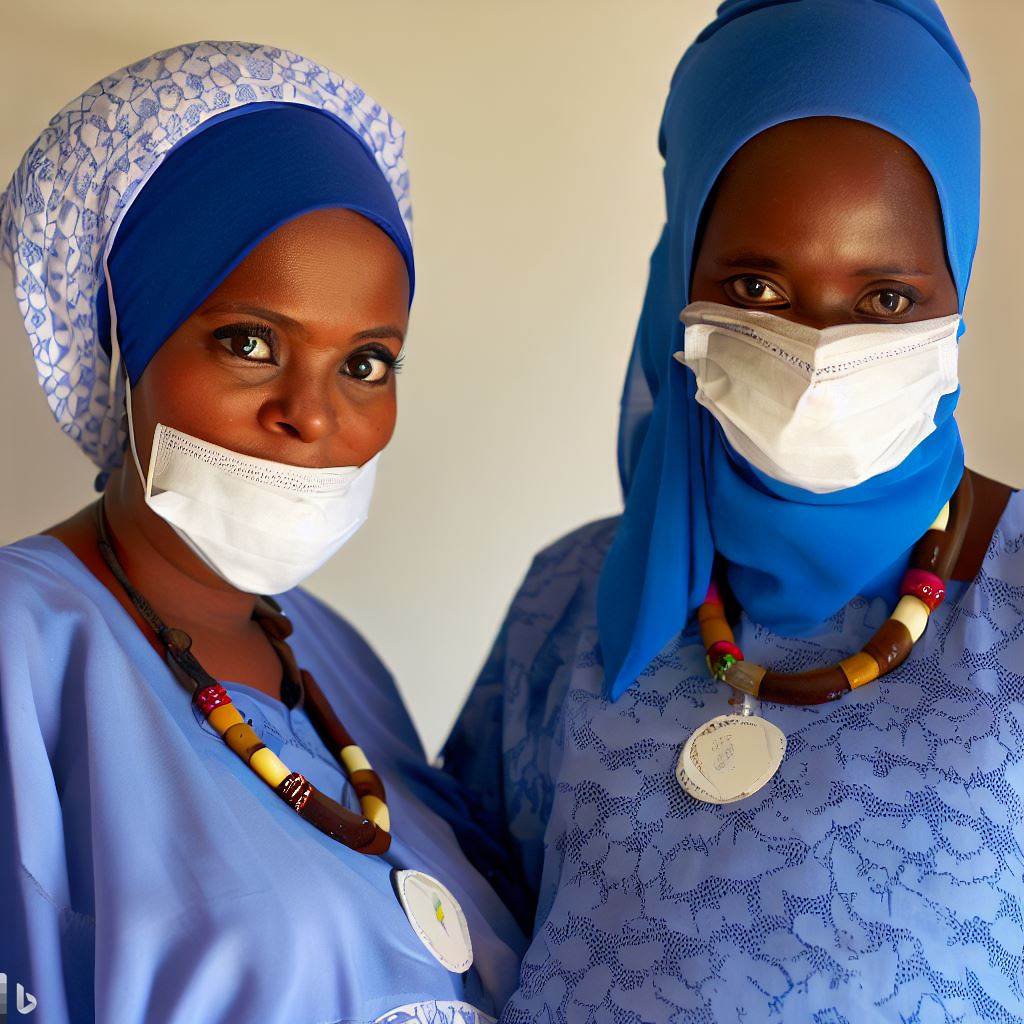Introduction
Nurse midwives play a crucial role in maternal health, providing essential care during pregnancy, childbirth, and postpartum.
Overview of the Maternal Health Situation in Nigeria
In Nigeria, maternal health remains a significant concern with high maternal mortality rates and limited access to quality healthcare.
- Nurse midwives bring expertise and compassion, reducing maternal mortality and improving health outcomes.
- Challenges in Nigeria include inadequate healthcare infrastructure and disparities in rural areas.
- Despite efforts, many pregnant women lack proper prenatal care, leading to preventable complications.
- Cultural beliefs and limited awareness hinder timely interventions and skilled birth attendance.
- The government must invest in training and deploying more nurse midwives to underserved regions.
- Community education and partnerships with local leaders can raise awareness and promote maternal health.
- Empowering nurse midwives will be pivotal in achieving Sustainable Development Goal 3 – ensuring healthy lives.
Importance of Nurse Midwives in Maternal Health
The role of nurse midwives in providing care during pregnancy, childbirth, and postpartum period
Nurse midwives play a crucial role in delivering comprehensive healthcare services to pregnant women.
They provide holistic care, including prenatal check-ups, monitoring fetal development, and offering education on nutrition and exercise.
During childbirth, nurse midwives ensure a safe and comfortable delivery process for both the mother and the baby.
They possess the skills to manage complications that may arise during labor and delivery. Postpartum, nurse midwives provide support services to help mothers recover physically and emotionally.
They offer guidance on breastfeeding, postpartum care, and contraception. Nurse midwives also assist in detecting and managing postpartum depression or other mental health issues.
The shortage of healthcare professionals and the need for nurse midwives in Nigeria
Nigeria faces a significant shortage of healthcare professionals, especially in remote rural areas.
This shortage undermines access to quality healthcare for pregnant women, leading to high maternal mortality rates.
Nurse midwives can bridge the gap in healthcare access by providing essential maternal care services in underserved regions.
Their expertise can help reduce maternal mortality rates and improve maternal and infant health outcomes.
The presence of nurse midwives ensures that pregnant women receive timely and appropriate care, thereby preventing complications.
Furthermore, nurse midwives can address cultural practices and beliefs that may influence maternal health negatively.
They can educate communities about the importance of antenatal care, skilled birth attendants, and postpartum care.
Training and deploying more nurse midwives in Nigeria is crucial for achieving Sustainable Development Goal 3, which aims to ensure healthy lives and promote well-being for all.
Nurse midwives not only enhance maternal health but also contribute to the overall improvement of the healthcare system in Nigeria.
Their presence results in cost-effective care, increased healthcare utilization, and improved health outcomes for mothers and children.
The role of nurse midwives in Nigeria cannot be overstated.
They are key players in providing comprehensive maternal care, reducing maternal mortality rates, and promoting the overall well-being of women and infants.
A robust investment in training and deploying nurse midwives is essential to address the healthcare professional shortage and improve maternal health outcomes in Nigeria.
Read: Nurse Midwife Education: Courses and Training in Nigeria
Improving Access to Maternal Health Services
The impact of nurse midwives in expanding access to healthcare in rural and underserved areas
Nurse midwives play a crucial role in improving access to maternal health services in Nigeria. Their presence in rural and underserved areas ensures that women have access to essential care.
By providing skilled assistance during childbirth, nurse midwives contribute to reducing maternal mortality rates.
They are trained to handle normal deliveries, which enables them to serve women in remote locations. Nurse midwives offer prenatal and postnatal care, enhancing the overall health of expectant mothers.
Their ability to identify high-risk pregnancies helps in early intervention and appropriate referrals. In rural areas, nurse midwives often serve as the primary healthcare provider for women.
Through their services, nurse midwives ensure that marginalized communities receive adequate care. Their presence in these areas decreases the need for women to travel long distances for healthcare.
Overall, nurse midwives have a significant impact on expanding access to maternal health services in Nigeria.
Community outreach programs and education initiatives led by nurse midwives
Nurse midwives in Nigeria are actively involved in community outreach programs. These programs focus on raising awareness about maternal health and the importance of prenatal care.
Nurse midwives conduct informative sessions on nutrition, hygiene, and healthy lifestyle choices. They educate women on family planning methods and provide contraception counseling.
Through education initiatives, nurse midwives empower women to make informed decisions about their health. Nurse midwives play a crucial role in dispelling myths and addressing cultural barriers to healthcare.
They work closely with local leaders and community influencers to gain trust and support for healthcare services.
By engaging with the community, nurse midwives ensure the sustainability of their initiatives. These programs also contribute to reducing stigma and improving the acceptance of maternal healthcare.
Nurse midwives’ community outreach efforts are key in achieving comprehensive and accessible maternal health services.
In review, nurse midwives have a profound impact on improving access to maternal health services in Nigeria.
Their presence in remote and underserved areas ensures that women receive skilled care during pregnancy, childbirth, and postpartum.
Furthermore, their community outreach programs and education initiatives enable women to make informed decisions about their health.
By working closely with local communities, nurse midwives contribute to reducing maternal mortality rates and promoting overall maternal well-being in Nigeria.
Read: Balancing Work and Life as a Doctor in Nigeria
Quality Care and Positive Outcomes
Examination of the evidence supporting the positive impact of nurse midwives on maternal health outcomes
Numerous studies have shown that the presence of nurse midwives during childbirth leads to improved maternal health outcomes.
Research has demonstrated that women attended by nurse midwives have lower rates of cesarean sections and other interventions.
Studies have also shown that nurse midwives play a crucial role in reducing maternal mortality rates.
The expertise and skills of nurse midwives contribute to early detection and management of complications during pregnancy and childbirth.
Nurse midwives provide continuous care, leading to enhanced patient satisfaction and better overall experiences for women.
Overall, the evidence overwhelmingly supports the positive impact of nurse midwives on maternal health in Nigeria.
Examples of successful interventions and practices implemented by nurse midwives in Nigeria
Nurse midwives in Nigeria have implemented community-focused programs to improve maternal health outcomes.
They have established antenatal clinics in rural areas, providing essential care and education to pregnant women.
Nurse midwives have been instrumental in promoting breastfeeding and providing lactation support to new mothers.
They have implemented culturally-sensitive approaches to maternal health, considering traditional practices and beliefs.
Nurse midwives have conducted outreach programs to educate communities about the importance of skilled birth attendance.
They have collaborated with other healthcare professionals to develop comprehensive care plans for pregnant women.
Nurse midwives have played a key role in providing postpartum care and monitoring the health of new mothers.
They have advocated for policy changes to improve the overall quality of maternal healthcare services in Nigeria.
Nurse midwives have actively participated in research and quality improvement initiatives to advance the field.
The successful interventions and practices led by nurse midwives have had a significant positive impact on maternal health in Nigeria.
By focusing on evidence-based care and implementing innovative interventions, nurse midwives in Nigeria are making a remarkable difference in the lives of pregnant women and new mothers.
Their role in promoting positive maternal health outcomes cannot be underestimated.
With their expertise, dedication, and collaboration with healthcare teams, nurse midwives continue to transform the landscape of maternal care in Nigeria, ensuring safer and healthier pregnancies and childbirth experiences for women throughout the country.
Read: Importance of Nurse Midwives in Nigeria’s Healthcare System

Collaborative Care and Teamwork
Overview of the collaborative relationship between nurse midwives and other healthcare professionals
Nurse midwives work closely with doctors, nurses, and other healthcare professionals. Collaboration is essential to provide holistic care to pregnant women and new mothers.
By working together, healthcare professionals can ensure the best outcomes for mothers and babies. Nurse midwives rely on the expertise and support of their colleagues in different specialties.
The collaborative relationship allows for the sharing of knowledge and skills among healthcare professionals.
Collaboration helps in developing a comprehensive care plan, addressing various aspects of maternal health.
Effective communication and mutual respect are crucial in fostering a successful collaborative relationship.
The collaborative relationship between nurse midwives and other healthcare professionals promotes continuity of care.
Teamwork enhances the overall quality and efficiency of maternal healthcare services in Nigeria.
The collaborative relationship creates a supportive and nurturing environment for both patients and healthcare professionals.
Importance of teamwork in providing comprehensive care to pregnant women and new mothers
Teamwork ensures that all aspects of maternal healthcare are addressed effectively.
Collaboration among healthcare professionals reduces the risk of medical errors and improves patient safety.
Team-based care allows for a multidisciplinary approach to managing complex cases.
By pooling their expertise, healthcare professionals can develop innovative solutions to maternal health challenges.
Teamwork promotes shared decision-making, involving patients in their care and treatment plans. Through collaboration, healthcare professionals can provide culturally sensitive and patient-centered care.
Teamwork facilitates coordinated care between different healthcare settings, ensuring seamless transitions for patients.
Collaboration improves access to specialized services and resources for pregnant women and new mothers.
Team-based care fosters a supportive work environment and reduces professional burnout among healthcare professionals.
By working together, healthcare professionals can effectively address social determinants of health in maternal care.
In fact, the collaborative relationship between nurse midwives and other healthcare professionals plays a vital role in improving maternal health in Nigeria.
Through teamwork, healthcare providers can provide comprehensive and holistic care to pregnant women and new mothers.
Collaboration ensures the exchange of knowledge, enhances care coordination, and promotes patient-centered decision-making.
By working together, healthcare professionals can overcome challenges and deliver high-quality care to improve maternal health outcomes in Nigeria.
Read: How Nigerian Doctors are Combating Local Health Crises
Challenges and Future Directions
Challenges faced by nurse midwives in Nigeria
- Limited resources pose a significant challenge for nurse midwives, hindering their ability to provide quality maternal healthcare.
- Low pay for nurse midwives discourages professionals from staying in the field, leading to a shortage of skilled healthcare providers.
- Cultural barriers, such as traditional practices and beliefs, often impede nurse midwives’ efforts to promote safe motherhood.
Potential solutions and strategies to overcome these challenges and improve maternal health
- Enhanced resource allocation: The government should increase funding for maternal healthcare to provide necessary equipment and supplies for nurse midwives.
- Improved compensation packages: Higher salaries and benefits are crucial to attract and retain skilled nurse midwives in Nigeria.
- Cultural sensitivity training: Nurse midwives should receive comprehensive training to understand and respect local customs and traditions, facilitating better communication and trust with communities.
- Collaborative partnerships: Engaging community leaders, traditional birth attendants, and religious institutions can help nurse midwives overcome cultural barriers and gain community support.
- Strengthening education and professional development: Continuous training and mentorship programs can enhance nurse midwives’ skills and knowledge, improving the quality of care provided.
- Telemedicine and technology integration: Leveraging digital platforms can enable nurse midwives to reach remote areas, provide virtual consultations, and access medical resources.
- Research and data-driven policy: Investing in research and collecting robust data on maternal health outcomes can inform evidence-based policies and interventions.
- Advocacy for policy changes: Nurse midwives should actively advocate for policy reforms and prioritization of maternal healthcare within the national agenda.
In short, nurse midwives in Nigeria face several challenges, including limited resources, low pay, and cultural barriers.
To improve maternal health, solutions like enhanced resource allocation, improved compensation packages, and cultural sensitivity training must be implemented.
Collaborative partnerships, education, technology integration, research, and advocacy are also crucial for overcoming these challenges and creating a brighter future for maternal healthcare in Nigeria.
Read: The Path to Becoming a Surgeon in Nigeria
Conclusion
In summary, nurse midwives have had a significant impact on maternal health in Nigeria. They have contributed to reducing maternal mortality rates and improving access to quality care for pregnant women.
Nurse midwives play a crucial role in providing prenatal, antenatal, and postnatal care, as well as assisting in delivering babies.
Their knowledge and skills have been instrumental in ensuring safe childbirth and reducing complications during the process.
Publish Your Professional Profile, Business or Brand
Showcase your expertise, gain trust, and boost visibility instantly on Professions.ng.
Publish NowBy providing education and counseling, nurse midwives empower women and promote healthy behaviors, leading to improved overall maternal health outcomes.
However, despite their valuable contributions, nurse midwives still face challenges in Nigeria.
There is a shortage of trained professionals in the field, which limits their ability to reach all pregnant women in need of care.
In addition, there is a lack of resources and infrastructure, especially in rural areas, hindering the provision of comprehensive maternal healthcare services.
To address these challenges and further improve maternal health in Nigeria, continued support and investment in the nurse midwifery profession are essential.
The government should prioritize the training and deployment of more nurse midwives, particularly in underserved areas.
Funding should be allocated to improve healthcare facilities and equipment, ensuring that nurse midwives have the necessary resources to provide quality care.
Furthermore, community involvement and awareness campaigns should be intensified to educate pregnant women about the importance of seeking care from nurse midwives.
This will help increase demand for their services and promote a culture of safe childbirth and maternal health.
Generally, nurse midwives are a fundamental component of the healthcare system in Nigeria, playing a vital role in improving maternal health outcomes.
Ongoing support, investment, and collaboration between the government, healthcare institutions, and communities are necessary to further enhance the impact of nurse midwives and ensure better maternal health for all Nigerian women.




